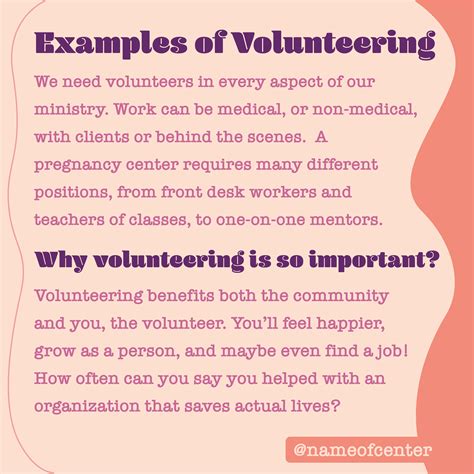Volunteering is defined as unpaid work done for a non-profit organization or a cause. It can come in many forms, from simple tasks to specialized skills. Volunteers contribute their time, energy, and expertise to make a difference in their communities and beyond.

Types of Volunteer Activities
The scope of volunteer work is vast, encompassing a wide range of activities. Some common examples include:
- Community service: Helping local organizations, such as food banks, soup kitchens, homeless shelters, and senior centers.
- Social work: Providing support to vulnerable populations, including children, the elderly, the disabled, and the underprivileged.
- Environmental conservation: Protecting and preserving natural resources, such as forests, rivers, and wildlife.
- Education: Tutoring students, teaching classes, or mentoring youth.
- Healthcare: Assisting nurses and doctors in hospitals, clinics, and long-term care facilities.
- Disaster relief: Responding to natural disasters, such as floods, earthquakes, and hurricanes.
- Animal welfare: Caring for animals in shelters, wildlife sanctuaries, and zoos.
- Sports and recreation: Coaching youth sports teams, volunteering at community events, and leading outdoor activities.
- Fundraising: Organizing events, selling products, and soliciting donations for charitable organizations.
- Research and advocacy: Assisting with scientific research, policy analysis, and public awareness campaigns.
Benefits of Volunteering
Volunteering offers numerous benefits to both the individual and society at large:
- Personal Growth: Develops skills, builds confidence, and enhances self-esteem.
- Meaningful Contribution: Makes a tangible difference in the lives of others and the community.
- Social Connections: Creates opportunities to meet new people and build lasting relationships.
- Health Benefits: Improves physical and mental well-being through social interaction and physical activity.
- Community Impact: Strengthens communities by fostering civic engagement and collective action.
Measuring Volunteerism
According to the Bureau of Labor Statistics, over 62.6 million Americans volunteered in 2021, contributing an estimated 3.2 billion hours of work. This translates to approximately $77 billion worth of services provided to various sectors of the economy.
Ethical Considerations
While volunteering is generally a positive experience, it is important to consider the ethical implications involved:
- Exploitation: Ensure that volunteers are not taken advantage of and their time is valued.
- Safety: Prioritize the safety and well-being of volunteers, especially those working in vulnerable environments.
- Confidentiality: Respect the privacy and confidentiality of individuals served by the organization.
- Cultural Sensitivity: Be aware of and respect cultural differences when volunteering in diverse communities.
How to Find Volunteer Opportunities
Finding volunteer opportunities is easy with the following resources:
- VolunteerMatch: An online database connecting volunteers with organizations in their area.
- Idealist: A platform that lists volunteer opportunities worldwide.
- Local Libraries and Community Centers: Often host volunteer fairs and connect job seekers with local organizations.
- Social Media: Follow non-profit organizations on social media to stay informed about volunteer openings.
- Ask Friends and Colleagues: Reach out to your network to inquire about potential volunteer opportunities.
Effective Strategies for Volunteer Managers
Managing volunteers effectively involves the following strategies:
- Clear Communication: Provide volunteers with clear instructions, expectations, and support.
- Training and Orientation: Train volunteers to ensure they have the necessary skills and knowledge to perform their tasks effectively.
- Recognition and Appreciation: Show your appreciation for volunteers’ contributions through regular feedback and recognition.
- Skill Matching: Match volunteers’ interests and skills to appropriate roles within the organization.
- Flexibility and Accommodation: Be flexible in accommodating volunteers’ schedules and needs to maximize their engagement.
Common Mistakes to Avoid
To ensure successful volunteer management, avoid these common mistakes:
- Overwhelming Volunteers: Avoid overwhelming volunteers with too many tasks or responsibilities.
- Lack of Support: Failing to provide volunteers with adequate training, resources, or supervision.
- Poor Communication: Not communicating expectations clearly or providing timely feedback to volunteers.
- Lack of Recognition: Not recognizing and appreciating volunteers’ contributions.
- Micromanaging: Constantly hovering over volunteers or not giving them enough autonomy.
Pros and Cons of Volunteer Work
Pros:
- Make a meaningful difference
- Gain valuable experience and skills
- Build social connections
- Improve physical and mental well-being
- Strengthen communities
Cons:
- Can be time-consuming
- May not always be convenient or accessible
- Potential for exploitation or lack of recognition
- May not always align with career goals
- Can face safety risks in certain settings
